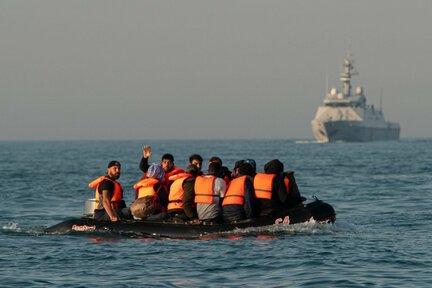On another catch-22 – Frances Webber in LRB:
“The home secretary, Priti Patel, claims that the asylum provisions in the Nationality and Borders Bill, which returned to the House of Commons on 22 March after a mauling in the Lords, are ‘humane, compassionate and fair’. It’s hard to recognise these qualities in a bill that is intended to look tough, by dividing refugees up into those who do and those who don’t have visas, or who aren’t eligible for entry under a recognised resettlement scheme. Many of its measures are aimed at stopping uninvited refugees arriving at Britain’s borders. Anyone landing at a UK port without a visa will immediately be liable to a four-year prison sentence. The bill also criminalises anyone – including humanitarian volunteers – taking asylum seekers without visas to a port in order for them to claim asylum, with the maximum penalty now life imprisonment. (An exception for coastguards and lifeboat crews, and other rescuers in certain circumstances, was brought in during the bill’s passage.) Refugees, of course, are rarely able to get visas: you aren’t classified as a refugee under the 1951 Geneva Convention until you are outside your country and unable or unwilling to return. And once outside it, you will be told you’re not eligible for a visa because you’re in a safe third country.
This is the catch-22 that results in the dangerous journeys organised by people smugglers.”
(…)
“The invasion of Ukraine has brought these issues into relief. Public opinion and backbench unrest have pushed the government by degrees to be more generous: the offer of visas to extended family members in Ukraine of British citizens and settled migrants in the UK is far more generous than most refugees get (though it’s less than Ukrainians are being offered elsewhere in Europe). The Homes for Ukraine scheme announced by the Department for Levelling Up is a stroke of genius, a heart-warming gesture that relies on charities to do the work of finding refugees and matching them to sponsors, and on public generosity to house them. It pleases the Tory right, which is happy enough to take in those of ‘good human stock’, as the 1949 Royal Commission on Population put it. It silences all those who have been complaining about the absence of ‘safe and legal routes’ and puts refugee charities in the invidious situation of having to support and help implement a scheme that gives preferential treatment to one group of refugees over all others. Potential beneficiaries still have to apply online for a visa and fill in a complicated form; those without passports still have to attend a visa application centre; all must wait, in uncomfortable or intolerable conditions, for the visa to be issued. A visa system like this enables the government to choose the refugees it wants to let in, producing a system that makes a mockery of the provision in the Universal Declaration of Human Rights of the ‘right to seek and enjoy asylum’.”
(…)
“The bill also gives Border Force officials the power to intercept migrant boats in the Channel and turn them round, and provides those officials with civil and criminal immunity for deaths or injuries ‘reasonably’ caused during such operations. It also enables ministers to strip people of citizenship without notice for a wide variety of reasons. This clause was voted down in the House of Lords, which also removed the clauses criminalising those who arrive in the UK without visas, establishing the two-tier refugee system, and the ‘offshoring’ provisions, which would allow asylum seekers to be sent to another country temporarily or permanently (the bill does not specify). Lord Dubs – who came to Britain as a small child on the Kindertransport – added a clause that extends family reunion rights, and gives children who are on their own in Europe the right to join family members here (for the Home Office, if a child is alone in a country like France or Greece this is not a sufficiently ‘serious and compelling circumstance’ to allow them to join a relative here). The Lords also added a right to work for asylum seekers who have spent six months waiting for their claim to be determined – something long demanded by refugee support groups and business leaders.”
Read the article here.
The EU does it illegally, the UK will do it legally: pushbacks.
First class and second-class citizenship makes a mockery of the idea, even in theory, of equality for the law. If there is a space that the word equality should be taken seriously, it’s there, for the law.
Also, the wanted and und unwanted refugees. Freud said that you cannot love everybody. And it’s too human that you feel more for people who might look like you than for people who are seemingly completely different, but letting refugees in is not about love.
It’s in many cases about saving people’s life, directly or indirectly.
And I’m not a fool, I know that all identity requires another. People don’t have to like refugees, all we need is politicians who say, we are not turning this into a political game in order to gain votes.
Well, refugees have been part of a political game for as long as the word refugee existed, I would say.
And it’s not only the politicians.
Being tough on refugees, appearing to be tough on refugees is apparently a virtue in certain circles.
Ah well, the people, they don’t want to be disturbed by other people’s suffering. The unlucky ones should die in their own country.
